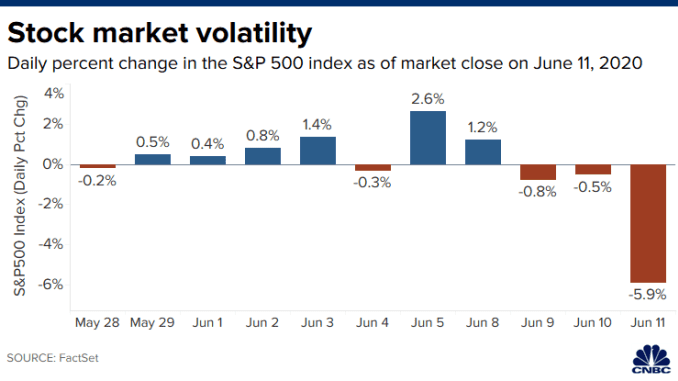The Dow Jones Industrial Average and S&P 500 fell for the first time in three days on Wednesday as investors weighed the prospects of reopening the economy along with a dismal report on U.S. payrolls.
The 30-stock Dow closed 218.45 points lower, or 0.9%, at 23,664.64. The Dow reached its session low in the final hour of trading. The S&P 500 slid 0.7% to 2,848.42. Both indexes were up earlier in the day. However, the Nasdaq Composite rose 0.7% to 8,854.39 as big tech stocks built on their recent gains.
Facebook and Netflix rose 0.7% and 2.3%, respectively. Amazon gained 1.4% while Apple closed 1% higher.

“You’re seeing growth quickly reassert itself as leadership,” said Keith Lerner, chief market strategist at Truist/SunTrust Advisory, noting a comeback in value stocks “seemingly came and went in less than a week.” Lerner added the market has been “transitioning more into a trading range” after the wild moves seen earlier in the year.
Stocks were also under pressure as crude prices fell 2% to snap a five-session winning streak. Those losses led to a 2.6% drop in the S&P 500 energy sector. Occidental Petroleum fell 12.5% while Helmerich and Payne dropped 6.1%.
California will permit clothing stores, bookstores and flower shops to reopen for curbside pickup as soon as Friday while New York plans to ease restrictions on manufacturers, construction, and select retailers next week. This easing of restrictions has led investors to bet that the economy will restart in the near future.
“The market is enjoying the economy opening, albeit on a phased-in schedule but that more and more states are opening,” Quincy Krosby, chief market strategist for Prudential Financial told CNBC. “The numbers in terms of new cases remain at a level that does not, at this point, suggest that the opening is causing cases to rise.”
The fast-spreading coronavirus — which has inflected at least 1.2 million Americans and killed more than 70,000, according to Johns Hopkins University — has seen a leveling off of news cases in the U.S.

President Donald Trump acknowledged on Tuesday that “there’ll be more death” from coronavirus but argued that not reopening businesses would also cost people their lives in other ways such as drug overdoses and suicides.
However, recent economic data continues to show the economic damage being dealt by the virus and the shutdown of the economy. A report from ADP and Moody’s Analytics showed private payrolls were cut by 20.2 million last month. That was the worst report in the data series’ history. Still, it was not as bad as a Dow Jones estimate of 22 million job losses.
“This is what you get when government forces business to close and consumers are fearful to go outside,” said Peter Boockvar, chief investment officer at Bleakley Advisory Group. “We know however that as things reopen, many of these jobs will get restored but certainly to not anywhere near where they stood in February.”
“Let’s be honest, this is a healing process that is going to take years,” he said.
